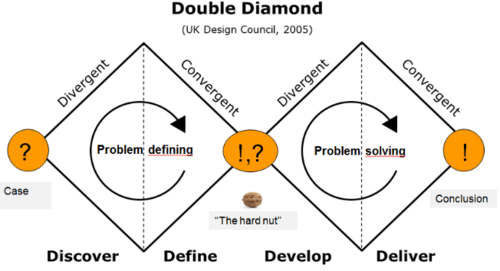The Double Diamond Tool: An efficient Project Management Tool
Developed by Wail Atrari
Abstract
This article will shed a light on a management tool called the Double Diamond process. The Double Diamond process covers a wide area of the problem-solving process. From discovering the initial problem to presenting a solve for this problem at the end of the process.
When managers are given a specific problem to solve, many managers quickly move on to the problem-solving phase, and try to solve that specific problem.[1]
This can result in the solution being only a temporary solution or being a solution to the wrong problem. And the reason for that, can be that not enough time has been spent on reviewing the actual problem and whether this problem is eligible. In other words, whether the so-called problem is the actual root of the problem. And this is where the Double Diamond tool will come in handy.
The Double Diamond tool was created by the Design Council in 2005, and consists of four smaller phases, which are utilized by special methods of thinking: Divergent and Convergent thinking, which this article will cover. The Double Diamond tool explores the problem to discover if the implied problem is the actual root problem or just a consequence of another problem. The Double Diamond tool forces the user to spend time on exploring the problem definition phase in order to discover the very source of the problem, before moving on to the problem-solving phases, which ensures that the correct problem is found and solved.[2] This article will describe the Double Diamond tool in detail, as well as give a step-by-step guideline on how a manager of a project can apply this tool in their projects. This article will also provide an example on how this tool can be used to prevent project managers exceed their allocated budget and time.
Contents |
Introduction
text
The problem defining phases
text
Discover
text
Define
text
The problem solving phases
text
Develop
text
Deliver
text
How to apply the double diamond tool in management situations
text
References
- ↑ [https://hbr.org/2017/01/are-you-solving-the-right-problems] Are you solving the right problems? - by Thomas Wedell-Wedellsborg
- ↑ [https://www.designcouncil.org.uk/sites/default/files/asset/document/ElevenLessons_Design_Council%20(2).pdf] A study of the design process - by Design Council
